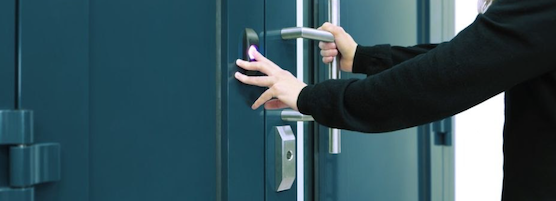A high-security bulletproof door, or also called a ballistic door or blast-resistant door, is simply put, a door panel that can withstand the ballistic force of a bullet, and thus can protect yourself from incidents such as:
- Forced entry
- Weaponry assaults
- Explosions
As well as other criminal attacks.
All elements of the door set, including frames, locks, hinges, and viewing panels must be thoroughly tested before the door set can be certified as a bulletproof security door.
Different Types of Bulletproof Doors
High-security bulletproof doors can come in various shapes and sizes to suit the owner’s requirements and functional needs. Ballistic doors can come as a sliding door, a traditional hinged door, or even a motorized door.
If necessary, high-security bulletproof doors can also be fitted with various accessories including custom locks (smart electronic locks) and bulletproof viewing windows. However, the door manufacturer must also factory-fit these accessories to ensure they also meet the required resistance level.
Materials Used
High-security bulletproof doors can be manufactured from various materials from steel, aluminium, glass, and even high-quality wood. Different materials would provide a different level of bullet resistance but if aesthetic is a concern, a specific material will also provide the appearance you desire while considering the rest of the building.
However, most ballistic doors are made from either steel or aluminium. Steel is considered the strongest and the most secure material to protect your property. However, aluminium is typically more affordable and is lighter (easier to move/slide) than steel, although it offers slightly less strength than steel doors. Aluminium doors are getting really popular at the moment, and can actually produce really high projective and explosion resistance.
The strongest, most secure door frames should offer a deep receiver channel for the infill to be inserted into. The larger the channel, the stronger the door should be since it can accommodate a thicker grille or mesh.
The grille or mesh that is inserted into the receiver channel can be made from various materials, but again, mainly they are made of steel or aluminium. Typically the bulletproof door would use plastic screws or clamps to secure the mesh in place.

How Do I Choose The Right Type of High-Security Bulletproof Door?
While choosing between different models and brands can be quite daunting, when choosing a ballistic door there are only three key considerations you should have:
- Security and protection: if a commercial property holds a lot of valuables and/or important people inside, then you’ll need a higher level of protection than a residential property.
- Design/looks: both in terms of material choice and design. Different mesh or barrier designs, for example, can produce distinctly different looks that might fit your property better.
- Budget: pretty self-explanatory, a custom-made and very strong bulletproof door would obviously cost more than a standard-strength aluminium door with a traditional design.
In the end, choosing your high-security bulletproof door is about balancing your needs with your budget. If you live in an area with a statistically high criminal rate and your property might be highly targeted, then you will need a high-end security bulletproof door that might be more expensive.
However, if weapon assaults and break-ins aren’t really common in your location, then you can either opt for a more affordable door or one with a simpler design for convenience.
What To Look For in a High-Quality Bulletproof Door?
When comparing between different high-security bulletproof doors, you should consider the following critical features:
Certifications and Standards
To ensure your doors are indeed bulletproof and can fulfil the task of protecting yourself and your property, look out for products that have been tested and rated by relevant security standards. High-security bulletproof doors from Fortified Estate, for example, have been tested and/or rated by the US Bureau of Diplomatic Security, NTS Chesapeake, IFT Rosenheim, and others.
Strength
Obviously, the ballistic door should be tested and rated for projectile and/or explosion resistance. However, the door’s frame must also be strong enough to withstand tampering, shaking, and impact damages.
A strong door frame should feature a deep and wide receiver channel for the infill to be inserted into. This is so that the edge of the frame can’t be pushed out of the frame easily. Also, doors with reinforced corners can make it even harder to remove.
Corrosion Resistance
Especially if your property is located in coastal areas and/or areas with high humidity, then your security doors are at risk of corrosion. You might want to choose a high-security bulletproof door that is made of corrosive-resistant materials like aluminium or stainless steel.
Locking System
While most intruders don’t plan on using the locks, having an advanced locking system (i.e. 3-point lock) can make it harder for criminals to pry the door off since there are three locks spread across the door frame instead of a single bolt.
Conclusion
Incorporating high-security bulletproof doors might be mandatory for certain commercial projects including but not limited to:
- Financial properties like banks, pawnshops, or other properties that might hold a lot of cash
- Mining, construction, and similar properties
- Police stations, prisons, and other security properties
- Public properties like hospitals, schools, and government properties




 POSTED BY
POSTED BY 

